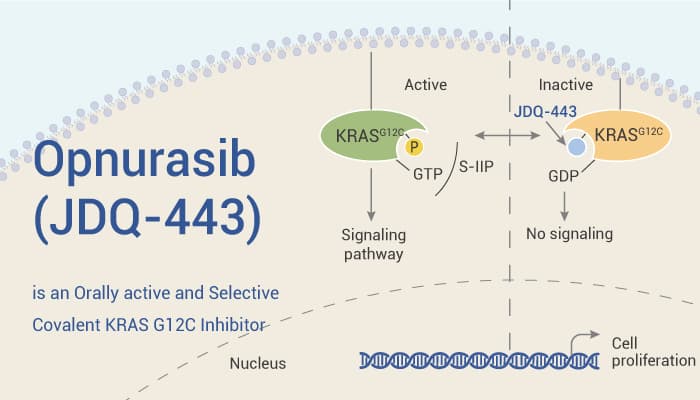Kirsten rat sarcoma (KRAS) is a member of the RAS family. KRAS is a key regulator of signaling pathways responsible for cell proliferation, differentiation, and survival. KRAS mutations are genetic drivers of multiple cancer types, especially colorectal cancer (CRC), pancreatic ductal adenocarcinoma (PDAC), and non-small cell lung cancer (NSCLC). And the mutations in KRAS can result in continuous cellular proliferation and cancer development. KRAS-G12 mutations (89%) predominate in human cancers, followed by G13 (9%) and Q61 (1%) mutations. Furthermore, the G12D mutation is the most common mutation among three common G12C (14%), G12D (36%), and G12V (23%) mutations.
KRAS G12C is an oncogenic driver mutation. Specifically, the KRAS G12C mutation occurs in about 13% of NSCLC patients, and 1%-3% of colorectal and other solid tumors. G12C is a single-point mutation with a glycine-to-cysteine substitution at codon 12. This substitution favors the activated state of KRAS, amplifying signaling pathways that lead to oncogenesis. Besides, the KRAS G12C inhibitor binds to the P2 pocket, trapping the oncoprotein in an inactive GDP-bound state. Thus, combinations of KRAS G12C inhibitors (Sotorasib or Adagrasib) with agents that target EGFR, IGF1R or PI3K can induce tumor regression.
Opnurasib (JDQ-443) is a structurally novel, potent, and selective covalent oral inhibitor of KRAS G12C.

Opnurasib covalently and selectively binds and inhibits GDP-bound KRAS G12C with low reversible binding affinity to the RAS switch II pocket. Therefore, Opnurasib potently inhibits KRAS G12C-driven cellular signaling and demonstrates selective antiproliferative activity in KRAS G12C-mutated cell lines, including those with G12C/H95 double mutations. Meanwhile, Opnurasib induces AUC exposure-driven antitumor efficacy in KRAS G12C-mutated cell-derived (CDX) and patient-derived (PDX) tumor xenografts. What’s more, single-agent Opnurasib activity is enhanced by combination with inhibitors of SHP2, MEK, or CDK4/6 in PDX models.
All in all, Opnurasib is an orally active and selective covalent KRAS G12C inhibitor.
References:
[1]. Liu J, et, al. Cancer Gene Ther. 2022 Jul;29(7):875-878.
[2]. Weiss A, et, al. Cancer Discov. 2022 Jun 2;12(6):1500-1517.